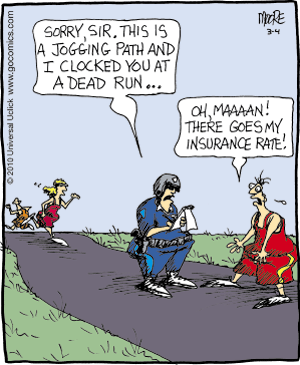 ...and were in one of those moods you get in after an entertaining week in the world which surrounds us. Yep, only more proof of the existentialist assertion we live in a world gone mad. So, right off the bat my (out-of-town runner) buddy & I are discussing health care, especially the lack of civility which crept into the debate, & definitely has shown in the aftermath of the bill passage. We're both pretty well aligned in the socioeconomic realm, in spite of our divergent belief structure (We've both taken the same side of a religious argument or two in the past couple of years, too - one of His Chosen People & one of His Red-Headed Stepchildren, tag-teaming...who knew?).
...and were in one of those moods you get in after an entertaining week in the world which surrounds us. Yep, only more proof of the existentialist assertion we live in a world gone mad. So, right off the bat my (out-of-town runner) buddy & I are discussing health care, especially the lack of civility which crept into the debate, & definitely has shown in the aftermath of the bill passage. We're both pretty well aligned in the socioeconomic realm, in spite of our divergent belief structure (We've both taken the same side of a religious argument or two in the past couple of years, too - one of His Chosen People & one of His Red-Headed Stepchildren, tag-teaming...who knew?). His solution to a contentious issue relating to womens' health was fairly entertaining; a variation of an old friend's recommendation for people who failed a basic civics examination (My friend was willing to limit to that and revocation of ones' right to participate in the electoral process. I would have added a mandatory two-year C-SPAN and PBS-only cable package in the mix, just to provide remediation somewhere.). Of course, the veterinary term (used in the comic above) was the term we both used as the solution...which when you're dehydrated, glycogen-depleted & fairly well stoopid after a mid-week run...sounded humorous to us & probably offensive as heck to the rest of the public immediately around.
His solution to a contentious issue relating to womens' health was fairly entertaining; a variation of an old friend's recommendation for people who failed a basic civics examination (My friend was willing to limit to that and revocation of ones' right to participate in the electoral process. I would have added a mandatory two-year C-SPAN and PBS-only cable package in the mix, just to provide remediation somewhere.). Of course, the veterinary term (used in the comic above) was the term we both used as the solution...which when you're dehydrated, glycogen-depleted & fairly well stoopid after a mid-week run...sounded humorous to us & probably offensive as heck to the rest of the public immediately around. Ah, but what do they know? Most of 'em were busy on their cell phones, trying to find answers to trivia questions. And perhaps some day the name/s of some of the screaming pundits will be little more than the answer to a trivia question for my grandchildren.
Ah, but what do they know? Most of 'em were busy on their cell phones, trying to find answers to trivia questions. And perhaps some day the name/s of some of the screaming pundits will be little more than the answer to a trivia question for my grandchildren.So there's no real variation from settlement to settlement along the Gulf Coast, huh? I would have never thought Port Aransas looked anything like our barrier island. Of course, when I was in Texas I had no desire whatsoever to be near the beach or a large body of water. I was in the Air Force; if I wanted to be near lots of water I would have joined the Navy, right? The irony is that now I've been with the Navy longer than I was with the Air Force...thanks for the reminder, amigo. But he's been working with the Air Force for the past two or three years...high time for him to get back on something big and gray and...
 And then, there was that thing on ESPN last night...saw it briefly...and I have to agree with the cartoon below.
And then, there was that thing on ESPN last night...saw it briefly...and I have to agree with the cartoon below.

















